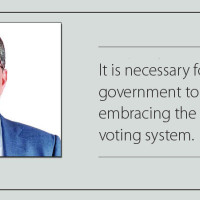- Wednesday, 11 February 2026
Quake Victims Need Instant Relief
It is really heart-wrenching to read media reports of how the people are suffering in the recently quake-hit places of Jajarkot and West Rukum. When many people feel the bitter cold while even staying at their homes with warm clothing, it can be imagined how the unfortunate victims who have lost their homes are facing the harsh weather conditions in the quake affected areas.
Prime Minister Pushpa Kamal Dahal Prachanda showed his concern when he visited the quake-hit areas hours after the tragedy occurred and several of his ministers did the same. He also gave directives to the ministries concerned about how they must help the victims. But the government mechanism is slow and in spite of the concern showed, it takes time for the government to implement what it has decided on. However, the people there need immediate succour and proper shelter, food and clothing to get through this tragic incident.
Distressing news
Meanwhile, the weather forecasting division has given more distressing news of how the period would become colder in the days to come. Most people know that the period between November and end of January are the coldest times in the country. So, one can imagine the problems of the people while trying to save not only from hunger but also the cold climate. It may be futile to say that Jajarkot and Rukum West are some of the remotest parts of the country and reaching these places is difficult.
The Rising Nepal has published several reports about the difficult situation the poor people in the quake-hit areas are facing. In one report it has also mentioned that the elderly, women and children are the worst affected and more than two dozen individual have died because of the cold climate. Other media outlets have also vividly described the distress the people are facing in the areas. One popular TV channel showed the devastating scenario of mostly destroyed houses and the difficulties of mostly elderly people and also the younger generation who have lost their close family members when the earthquake hit some of the worst-affected villages.
“I cannot sleep or even eat when I think of the near and dear ones of mine who died during the quake,” one victim shares his agony. So this is a time when not only houses have to be rebuilt but also some sort of mental support that has to be given to these suffering people. This author would once more like to repeat that the cumbersome official process makes it difficult to provide instant assistance. Here one must mention the good work of the security forces in rescuing many individuals as soon as possible. So is the effort of the government, which just released billions of rupees to provide relief to the quake-affected people.
As the victims seem to need immediate help, bureaucratic 'red tape-ism' must be broken while helping these helpless victims. Now that the Finance Ministry has released funds, it is up to the local level authorities to see that the funds are properly utilised and the actual victims receive the government's gesture in recognising their plight.
One must also not forget the efforts of many youths, who have acted promptly to help the victims. This writer met a youngster by the name of Kalyani, who not only went to the worst affected village of Nalgud in Jajarkot district, but stayed there to oversee the distribution of food and warm clothing to the victims. She told this writer that the 'one door' policy of the government hindered in some way the distribution of relief packages she had taken to the village. 'We know the good intentions of the government but such regulations must be done away with when individuals want to help these people' she said. Kalyani works for a local NGO, which also helped her by providing expenses for her travel and also a token amount of funds to provide food to the victims.
This is an admirable 'proactive' effort of an individual when many other youths are seeking to go abroad, and the government must also seek to encourage such youths to stay back in the country and work for the development of the nation in whatever way they can.
Meanwhile, the government must also accept the fact that Nepal is not only prone to earthquakes, which is not predictable, but also other natural calamities like floods and landslides which take place during the rainy seasons and which can be avoided with proper regulations and preventive measures.
Permanent mechanism
We need a permanent mechanism for disaster management. For now we must be satisfied with temporary relief, but we need a sense of security not only for natural calamities, but also health hazards like COVID-19, dengue and such spreading diseases which have troubled many nations of the world, especially the least developed ones.
The government must recognise the expertise of other more developed nations with strong economies and also seek their cooperation, so that we can also deal more efficiently with incidents of disaster. For example look at how quickly the Chinese government reacted when a deadly quake hit two of its provinces a few days back. It is the same with India which also instantly went into action when a deadly new virus was detected in one of its states.
Providing relief is one side of the coin, but it is better to be prepared well for any natural calamities or health hazards. But for now, helping the 'helpless' in Jajarkot and West Rukum is enough.
(The author is former chief editor of this daily.)
















